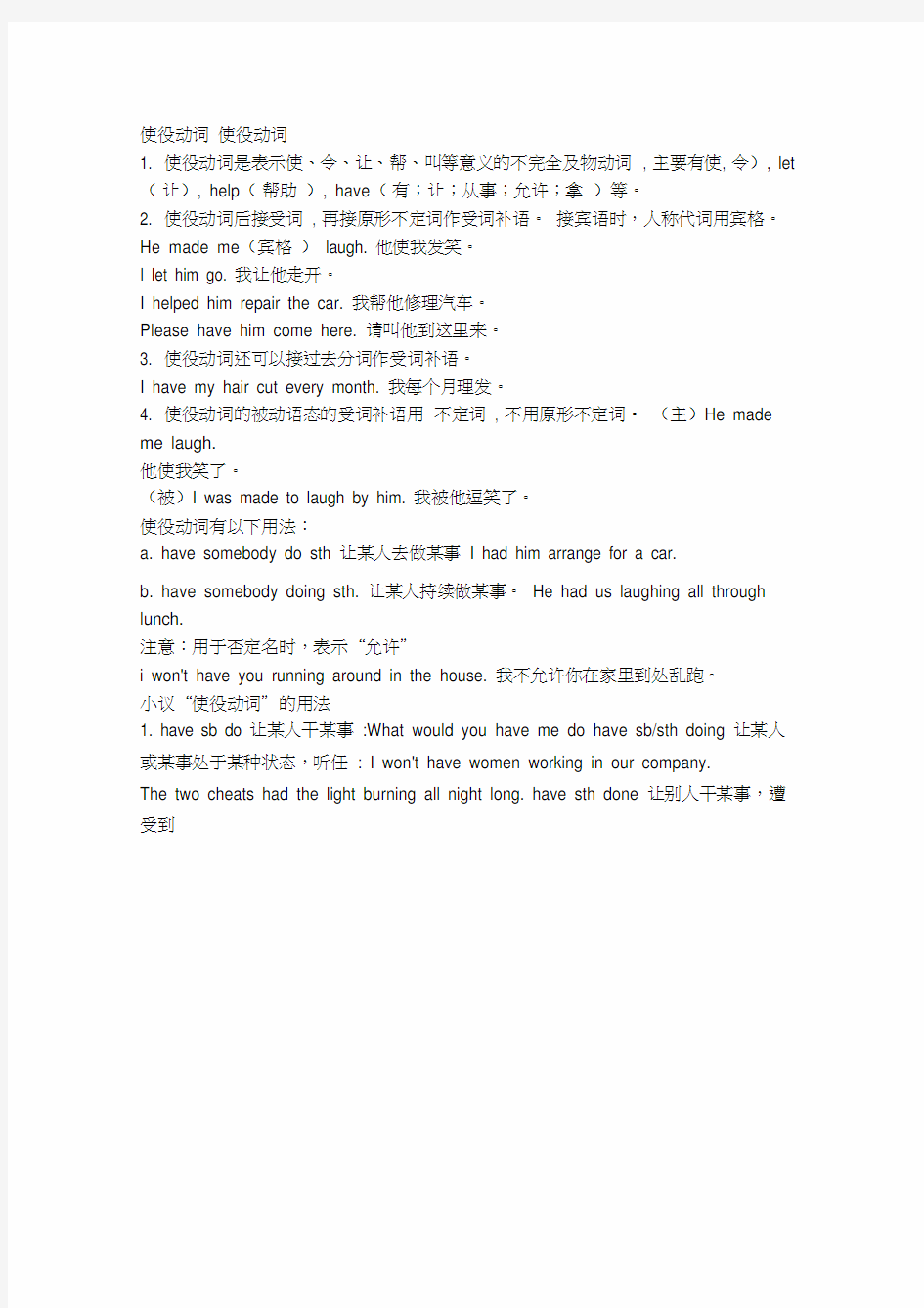

使役动词使役动词
1. 使役动词是表示使、令、让、帮、叫等意义的不完全及物动词, 主要有使, 令), let (让), help(帮助), have(有;让;从事;允许;拿)等。
2. 使役动词后接受词, 再接原形不定词作受词补语。接宾语时,人称代词用宾格。He made me(宾格) laugh. 他使我发笑。
I let him go. 我让他走开。
I helped him repair the car. 我帮他修理汽车。
Please have him come here. 请叫他到这里来。
3. 使役动词还可以接过去分词作受词补语。
I have my hair cut every month. 我每个月理发。
4. 使役动词的被动语态的受词补语用不定词, 不用原形不定词。(主)He made me laugh.
他使我笑了。
(被)I was made to laugh by him. 我被他逗笑了。
使役动词有以下用法:
a. have somebody do sth 让某人去做某事I had him arrange for a car.
b. have somebody doing sth. 让某人持续做某事。He had us laughing all through lunch.
注意:用于否定名时,表示“允许”
i won't have you running around in the house. 我不允许你在家里到处乱跑。
小议“使役动词”的用法
1. have sb do 让某人干某事:What would you have me do have sb/sth doing 让某人或某事处于某种状态,听任: I won't have women working in our company.
The two cheats had the light burning all night long. have sth done 让别人干某事,遭受到
:you 'd better have your teeth pulled out.
He had his pocket picked. notes: "done" 这个动作不是主语发出来的。
sb do sth 让某人干某事
:They made me repeat the story.
What makes the grass grow notes: I was made to repeat the story.
make sb/sth done/adj./n
. The news made him happy.
He couldn't make himself heard above the noise of the traffic.
His actions made him universally respected.
He made her his wife.
sb to do 使某人干某事
: I can't get anyone to do the work properly.
get sth done 让别人干某事
: I must get my hair cut .
Can you get the work finished in time sb to do sth 让某人干某事: We left him to paint the gate.
I'll leave you to settle all the business. leave sb doing 让继续处于某种状态: Don't leave her waiting outside in the rain.
We left him painting the gate. leave sth done/adj./ :Please excuse me if I have left any of your questions unanswered . His illness has left him weak .
I was left with a ray of hope.
使役性动词( Causative Verb )
/have/ let +sb +do sth. set/leave + sb to do/doing sth.
不完全及物动词
不完全及物动词
1. 不完全及物动词是除要有受词外, 还需要受词补语以补足其意义的及物动词。
【参见与格动词, 完全及物动词】
2. 由不完全及物动词构成的句型一般为: 主词+不完全及物动词+受词+受词补语。
His mother named him Tommy.
他母亲叫他汤米。
Tommy是受词补语, 若没有这个字, 这句话的意思就不完整, 因此named 是不完全及物动词。
不完全不及物动词其实就是联系动词, 虽有意义, 但不完全, 需要加名词、形容词、代名词等作主词补语以补足其意义。
联系动词按其含义可以分为二类。
类型1: 表示状态和状态的持续, 如:
be(是), seem(似乎), look(看起来), appear(似乎), feel(觉得), sound(听起来), smell(闻起来), taste(尝起来), keep(保持), remain(保持), stand(站立), lie(躺), stay(停留)等。
类型2: 表示从一种状态转变为另一种状态, 如:
become(变成), go(变得), get(变得), turn(变成), grow(变成), fall (变成某种状态), come(成为), run(变成)等。
值得注意的是:
联系动词没有被动式。
及物动词和不及物动词的用法比较
1)及物动词后面必须跟宾语意义才完整的实义动词,叫做及物动词(transitive verb)。如:
I believe that the committee will consider our suggestion. 我相信委员会将会考虑我们的建议。
“How long can I keep the book ”Harry asked. 哈里问:“这本书
我可以借多久”
Dr. Bethune set us a good example. 白求恩大夫给我们树立了好榜
样。
Crude oil contains many useful substances. 原油含有许多有用的
物质。
2)不及物动词本身意义完整后面不须跟宾语的实义动词,叫做不及物动词(intransitive verb)。如:
Birds fly. 鸟会飞。
It happened in June 1932. 这件事发生于一九三;年六月。
My watch stopped. 我的表停了。
She spoke at the meeting yesterday evening. 她在昨天晚上的会
上发了言。
3)兼作及物动词和不及物动词英语里有不少
实义动词可以兼作及物
动词和不及物动词。这样的动词又有两种不同的情况:
a)兼作及物动词和不及物动词时,意义不变。试比较:
Shall I begin at once 我可以立刻开始吗(begin 作不及物动词)
She began working as a librarian after she left school. 她毕业
后当图书馆管理员。(began 作及物动词)
When did they leave Chicago 他们是什么时候离开芝加哥的(leave 作及物动词)
They left last week. 他们是上周离开的。(left 作不及物动词)
b)兼作及物动词和不及物动词时,有时意义不尽相同。如:
Wash your hands before meals. 饭前要洗手。
Does this cloth wash well 这布经得起洗吗
4)与汉语的比较有时英语动词的及物和不及物的用法,与汉语的用法不一样,请注意下列两种情况:
a)有的动词在英语里只能用作不及物动词,而汉语则可用作及物动词,如arrive 到达,agree 同意,1isten 听。英语里这些动词后面常接介词。如:We arrived at the railway station at noon. 我们于中午到达火车
站。(at 不能省去)(比较:We reached the railway station at noon.)Everybody listened to the lecture with great interest. 每个人都很有兴趣地听讲课。(to 不可省去)(比较:We all heard the lecture.)
Do they agree to the plan 他们同意这个计划吗(to 不可省去)
b)有的动词在英语里能用作及物动词,而在汉语里则不能用作及物动词,如serve 为?服务。
Our children are taught to serve the people wholeheartedly. 我们的儿童被教以全心全意为人民服务
(一)have 使,让,不用于被动语态
○1 .have + 宾语+done
(1)叫、让、请,致使别人做某事,动作的执行者不是主语也不是宾语而是别人。(强调主观的意志,即主语的意志致使某事发生或被做到)
—I ' ll have my bike repaired th is afternoon. 今天下午我要请人修自行车。
—I have my hair cut every month. 我每个月都理发。
表示主观意志的have 也可以用get 代替,例如:
—Where can I get (have )this printed 我在哪里能(找人)把这份东西打印出来呢(2)遭遇不幸事件(与主观意志完全无关)
—He had his wallet stolen at the station. 他的钱包在火车站不幸遭窃。
—He has his leg broken in a fall .他的腿摔断了。
2.have + 宾语+do 让??做某事,动作执行者为宾语
—He had her go there. 他让她去那儿。
—I have my children clean the house before you arrive .在你们来之前,我让孩子们把屋子打扫干净了。
这个结构中have 有时也可以用get 代替,但这时后面的动词不定式需带to ,例如:
—I got him to write a letter to my boss .我要他写一封信给我的雇主。
3. have + 宾语+adj. (形容词)/adv. (副词)/prep. (介词)促使某一动作发生,或使役动作产生的变化结果或状态。
—Please have your money ready. 请准备好钱。
4. have + 宾语+doing 让??持续做某事,或处于某种状态。动作执行者为句子宾语,但动词必须为持续性动词,后面常接时间段。
—He had her standing in the rain for two hours. 他让她在雨中站了两个小时。
或表示动作执行者打算做的事或预期的目标。
—We' ll soon have your car going again. 很快我们就会让你的车从新启动起来的。
还可以表示不愿引起某种后果
—Don't shout !you'll have the neighbours complaining. 别大声嚷!你会遭四邻抱怨的。
注意:用于否定句时,表示“允许”
—I won ' t have you smoking in the sitting room. 我不允许你在起居室抽烟。
(二)make 使??(有轻微强迫之意)
+ 宾语+do 迫使某人做某事,被动语态为be made to do
—The boy made the girl cry. 男孩把女孩惹哭了。
—The girl was made to cry by the boy. 女孩被男孩惹哭了。(被动)
+宾语+adj./adv./prep. 使??处于某种状态,使变得??
—His illness made him very weak. 他的病使他很虚弱。
—This boring soap opera made me sleepy. 这无聊的肥皂剧让我想睡觉。
+ 宾语 +doing 使??处于某种状态,强调动作的主动性
— The story made him feeling sad. 这个故事使他很难受。 — The bad weather made me staying at home yesterday.
昨天 , 坏天气是我一天
都呆在家里。
+宾语 +done 使??处于某种状态,强调动作的被动性
— Please speak louder to make yourself heard.
— The heavy bag made the chair broken.
+ 宾语 +n. 使??成为
— We made him the leader of the team. — She made her diary her best friend.
( 三 )leave 让,使,带走 既可用于主动语态也可用于被动语态
+ 宾语 +to do sth. 让某人做某事,强调未来动作
+宾语 +doing 让某人做某事,或继续处于某种状态,强调当时正在发生的动作
— What he said left me thinking deeply.
他的话使我陷入了沉思。
— Don ' t leave her waiting outside in the rain.
外面下雨,别让她在外面等
了。
+ 宾语 +done 使??处于某种被动状态,强调动作的被动性
— We can ' t leave such an important matter
unfinished. 我们不能让这
样一件重要的事半途而废。
宾语 +adj./adv./prep. 使??处于某一特定状态
— Don ' t leave the door unlocked.
别忘了锁门。
( 四 )get 使,让
+ 宾语 +to do 让??做某事,强调未来性动作
— He got his brother to help him.
他让他的兄弟帮助他。
+ 宾语 +done 让??被做,强调被动性动作
— He got the car started.
他发动了小汽车。
+ 宾语 +doing 让??做某事,强调正在进行的动作,或表示动作执行者打算做的事或预期 的目
标。
— She got her bike running very fast.
表示动作执行者打算做的事或预期的目标
请讲大声一点以便让别人听到你。
这个重重的包把椅子压坏了。
我们让他当我们的队长。 她把日记当做她最好的朋友。
— Leave him to do it himself.
让他自个儿去做这件事吧。
— Who left the door open
谁让门开着
她把自行车骑得飞快。